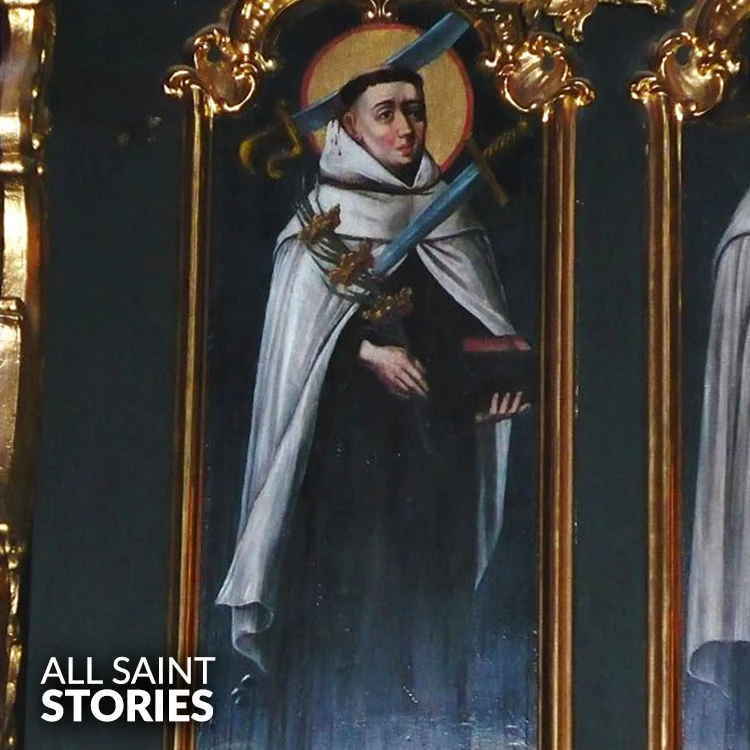Saint Angelus, devoted servant of God, guide us with your unwavering faith and courage. Help us follow the path of righteousness and remain steadfast in our trust in God’s will. Intercede for us, that we may grow in holiness and reflect the love of Christ in all we do. Through your prayers, may we find peace and grace in our hearts and lives. Amen.
ST. ANGELUS OF JERUSALEM
ST. ANGELUS OF JERUSALEM

St. Angelo of Jerusalem was a 13th-century Carmelite preacher and martyr. Born to Jewish converts, he excelled in theology and languages before joining the Carmelite Order. After years as a hermit, he was sent to Sicily, where he preached, converted many, and performed miracles. He was martyred in 1220 for denouncing a local tyrant.
St. Angelo, also known as St. Angelus, was born in 1185 in the Holy Land to Jewish parents who converted to Christianity after a vision of the Virgin Mary. The Blessed Mother foretold that their twin sons would be significant in the Church—one as a patriarch and the other as a martyr. From an early age, Angelo and his brother demonstrated deep intelligence and piety. They joined the Carmelite Order at 18, mastering Greek, Latin, and Hebrew.
Angelo lived as a hermit on Mount Carmel for five years, dedicating himself to contemplation and prayer. During this time, Jesus appeared to him, instructing him to travel to Sicily and spread the Gospel. Obedient to this call, he began preaching in Palermo, converting many, including a large number of Jews. His reputation as a miracle worker spread quickly, drawing crowds eager to witness his teachings.
Continuing his mission in Leocata, he openly condemned the corrupt and violent practices of a local nobleman, Berengarius. Enraged by this rebuke, Berengarius sent his men to attack Angelo while he was preaching. Struck down by swords, the saint remained conscious long enough to forgive his murderers before succumbing to his wounds in May 1220.
St. Angelo is venerated as a martyr of the Carmelite Order and a protector of the faithful. His life exemplifies devotion, courage, and the power of forgiveness.
Video Not Found
The information on this website is compiled from various trusted sources. While we aim for accuracy, some details may be incomplete or contain discrepancies.
If you notice any errors or have additional information about this saint, please use the form on the left to share your suggestions. Your input helps us improve and maintain reliable content for everyone.
All submissions are reviewed carefully, and your personal details will remain confidential. Thank you for contributing to the accuracy and value of this resource.
Credits & Acknowledgments
- Anudina Visudhar (Malayalam) – Life of Saints for Everyday
by Msgr. Thomas Moothedan, M.A., D.D. - Saint Companions for Each Day
by A. J. M. Mausolfe & J. K. Mausolfe - US Catholic (Faith in Real Life) – Informational articles
- Wikipedia – General reference content and images
- Anastpaul.com – Saint images and reflections
- Pravachaka Sabdam (Malayalam) – Saint-related content and insights
We sincerely thank these authors and platforms for their valuable contributions. If we have unintentionally missed any attribution, please notify us, and we will make the correction promptly.
If you have any suggestion about ST. ANGELUS OF JERUSALEM
Your suggestion will help improve the information about this saint. Your details will not be disclosed anywhere.
© 2026 Copyright @ www.allsaintstories.com







 English
English
 Italian
Italian
 French
French
 Spanish
Spanish
 Malayalam
Malayalam
 Russian
Russian
 Korean
Korean
 Sinhala
Sinhala
 Japanese
Japanese
 Arabic
Arabic
 Portuguese
Portuguese
 Bantu
Bantu
 Greek
Greek
 German
German
 Dutch
Dutch
 Filipino
Filipino